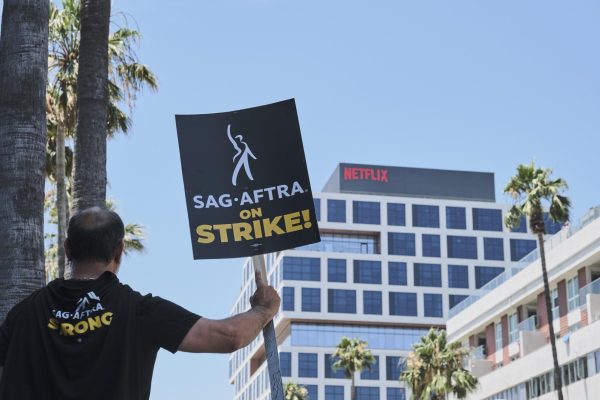
The sun hangs in the sky above Los Angeles and beats down on the picketing writers and actors below, but Rebecca Klingel takes the 90 degree heat in stride as she fights for her right to fair pay and better working conditions.
It is so hot in Los Angeles, rays of heat are quite literally pulsating mid-air. Trekking through heat like this feels like getting hit by a boulder. Honking and chanting engulfs Melrose Avenue and Larchmont Boulevard — like a half-mile-long symphony of noise. The picketers’ demands are simple: liveable wages for writers and actors and not replacing humans and human work with artificial intelligence.
These picketers represent the Writers Guild of America (WGA) and Screen Actors Guild-American Federation of Television and Radio Artists (SAG-AFTRA), two unions for writers and actors respectively. The WGA has been on strike since May 2, following failed negotiations with the Alliance of Motion Picture and Television Producers (AMPTP) over “working conditions, compensation structure and threats to their jobs including AI,” according to Time. SAG-AFTRA joined the strike on July 13 once their contract with the AMPTP ended.
The WGA and SAG-AFTRA strikes now hold Hollywood in gridlock. Even for an enigmatic industry, these strikes are making noise.
July 17, a boiling Monday, was an especially important day for Klingel. Although she preemptively moved to Arizona in May right before the strike commenced, she returned to Hollywood several times to participate.
Proudly donning an iconic and irreplicable bright blue WGA shirt, her purpose at this moment was undeniable. Her eyes were drawn to the ground in front of her as unperturbed determination leads her down Melrose Avenue and away from the ever so resilient chaos of the picket lines at Paramount Studios.
Klingel is a writer. She has worked on Netflix series such as “The Haunting of Hill House,” “The Haunting of Bly Manor,” “The Fall of the House of Usher” as well as the award winning podcast series “Borrasca.” Her eyes, whilst darting between the ground and my face to meet my gaze, were telling a story I hardly had to dig for. Her creativity and bustling mind were apparent from the moment I stopped her on the street with her anxious yet impassioned demeanor. Every mere movement seemed apprehensive and jittery.
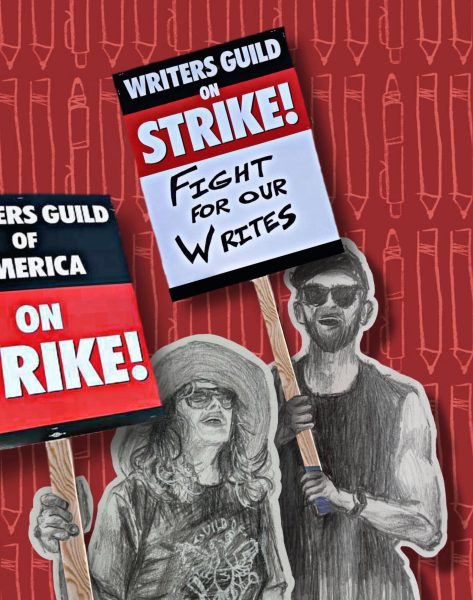
“I hope America knows that our artists are under attack,” Klingel says. She articulates her anger directly and profoundly. Every word is rigid and diligent. Hardworking doesn’t even draw close in detailing the passion she puts into her work.
These strikes affect every aspect of her livelihood and mean everything for her future as a writer in Hollywood. She is simply no longer able to make a living doing what she loves most.
The WGA is demanding increased minimum compensation in all mediums from pre to post-production, along with increased residuals and improvement in subsidies for protections and pensions, according to Vulture. Within the outline of proposals between the WGA and AMPTP, the WGA is asking for a mere 5-6% increase in minimum rates. These minimum rates are a fraction of what Hollywood executives make.
According to CNBC, one of Hollywood’s top executives, Warner Bros. Discovery CEO David Zaslav, made $498,914,318 between 2018 and 2022. The average annual salary of a screenwriter as of May 2021 is $69,510, according to Distractify.
Objectively, the work conditions over the four shows Klingel wrote for shifted. The first two shows she wrote were both nine to ten episodes over 20 weeks, whereas the other two shows were also nine or ten episodes but over ten weeks. Despite the two sessions being the same amount of work, Netflix wanted to pay writers half of their original pay for the second session.
Even after writing three Netflix shows – two of which were incredibly successful – and a critically acclaimed audio series, she knew the strike was coming and wages were being cut. So she got out of Los Angeles while she could.
Now participating in the biggest industry walkout Hollywood has seen in 15 years, she mentions her hope that newer writers and actors coming up in the industry get the protections and advocacy that so many before did not.
Creatives being taken advantage of and underpaid is not a rarity. Most writers and actors can’t qualify for health insurance because they don’t make enough within the industry, even when working full time.
The AMPTP and executives retain the accumulative wealth within this industry – not writers and actors. They also hold the majority of negotiating power at the moment.
According to Vanity Fair, anonymous members of the AMPTP say they plan to let members of the WGA “bleed out” before getting back to the negotiating table. An anonymous member of the AMPTP also stated their goal was to “allow things to drag on until union members start losing their apartments and losing their houses.”
Studio bosses also hold the power within this industry. Bob Iger is the current CEO of Disney and maintains a networth of $690 million as of 2019. While on CNBC’s “Squawk Box,” he said the actions and demands of those striking are “adding to a set of challenges that this business is already facing that is quite frankly very disruptive and dangerous.”
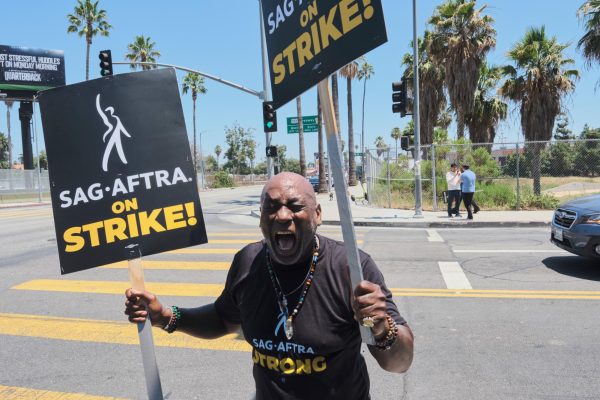
Despite the power of the AMPTP and studio bosses, the WGA and SAG-AFTRA stepped into the ring of corporate greed — collective bargaining’s age-old enemy. For artists, this means knowing their value.
“It means understanding what we bring to people everywhere,” says Aimee Parker, a member of SAG-AFTRA who has appeared in small roles in shows like “Chicago Med,” “Parks and Recreation” and “Scandal.”
Parker, along with her fellow SAG picket-liners, firmly believe they deserve a portion of the pie — the seemingly limitless capital of Hollywood. She says the corporate greed that has consumed the entertainment industry is what they’re up against.
“You can’t make TV and movies without background actors. All of us have to feel comfortable to stay in this game or it all falls apart,” Parker says.
Without reasonable pay for the actors that are essentially the backbone of Hollywood entertainment, the work in this industry is becoming an untenable sinking ship. “Corporate greed is ubiquitous. The rich get richer. It is not sustainable,” she says.
This stand against corruption and pay disparity between artists and executives is a stand for maintaining an industry that means so much to so many.
Hollywood does not just cultivate art. “We get to show humanity what humanity looks like,” says Amanda Schull, another SAG-AFTRA member and actress most notable for her roles in “Suits,” “Pretty Little Liars” and Syfy’s “12 Monkeys.” Though she has been able to find success in this industry, she speaks matter-of-factly with a fervor that reveals her frustration about the issues facing most actors in Hollywood.
Alyshia Osche, another SAG member and actress known for shows like HBO’s “True Detective,” CW’s “Life Sentence” and more recently, Hulu’s “The Other Black Girl” wants to see change. “87% of our union don’t even make $26,000 per year to qualify for health insurance,” she says.
She argues that these strikes aren’t about elitism or entitlement. They’re about making the lives of artists in the world’s biggest artistic industry sustainable.
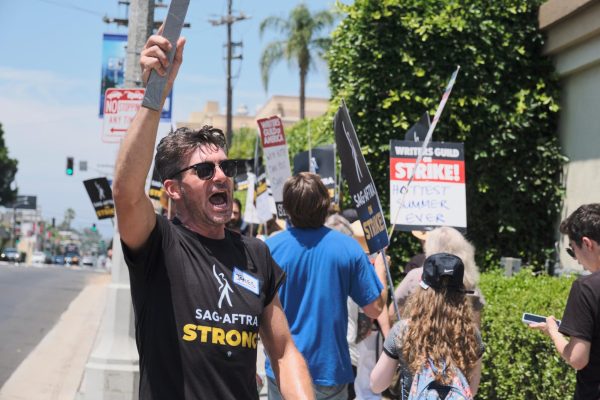
SAG-AFTRA is asking for an 11% raise in wage minimums instead of just the current 5% at hand. Oschi explains that with just a 5% raise, their wages will be less than what they were making in 2020 by 2026 due to rapidly rising inflation. “So by 2026, I will be more broke than I was in 2019,” she says.
Negotiations resumed on Aug. 11, and will continue for the next few weeks. Yet the matter remains unresolved. With studios facing mounting pressure with every production on hold, they will need to confront the possibility of finding compromise at the very least.
For so many writers and actors, the future of art in this country is uncertain. If the opportunity to make positive and substantive change isn’t taken now, we may lose it completely.
“I think this is a really good litmus for the rest of the world when it comes to compensating people fairly and recognizing value,” Parker says.



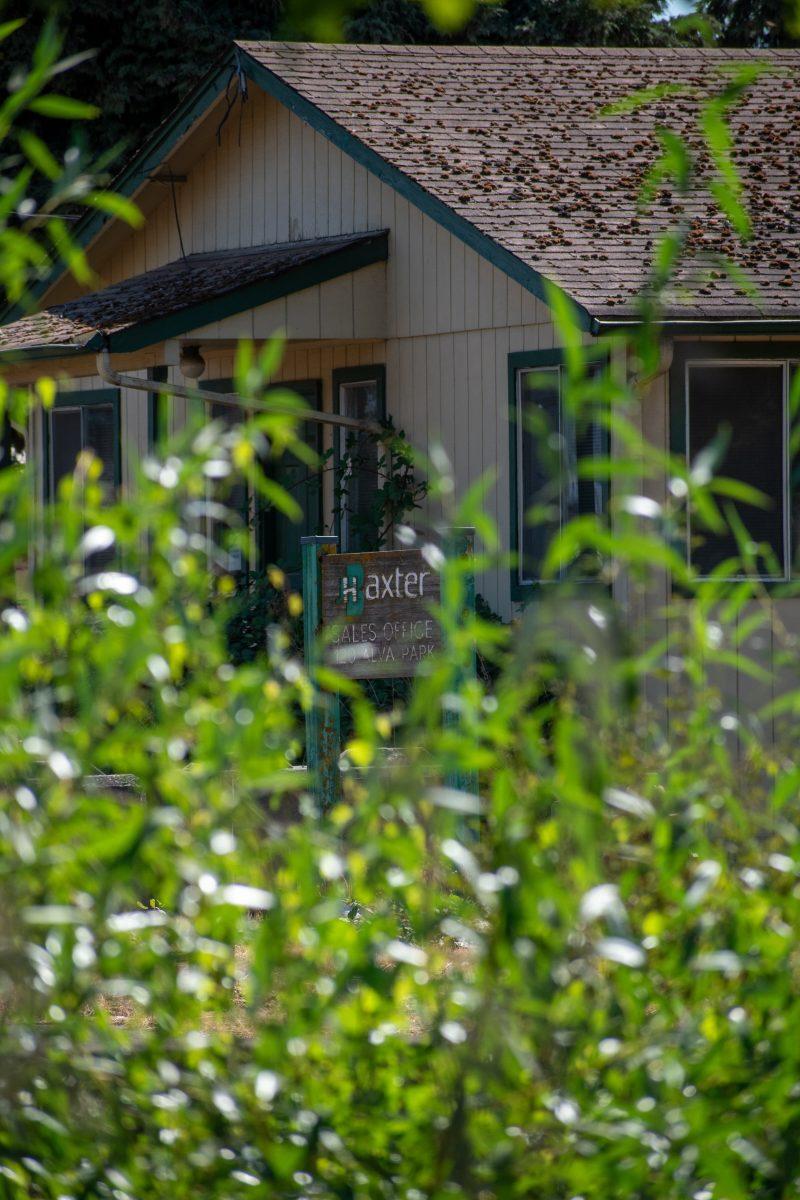



![[Photo Courtesy of the Lara Family]
Ruben embraces his beloved childhood goat, Katrina.](https://ethos.dailyemerald.com/wp-content/uploads/2025/05/katrina-1-1060x1200.jpg)


